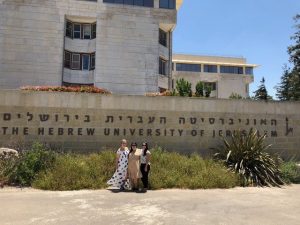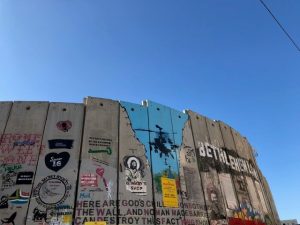International Summer University in Social Work 2018
Reflection by: Hannah Rushton, Kimberly Ajele & Dana Seidel
From July 8 to 18, 2018, we had the opportunity to participate in the International Summer University in Social Work (ISUSW) in Jerusalem, Israel. The ISUSW is an annual ten day conference wherein graduate students and professors from universities around the world convene to discuss an important social work topic. The focus of this year’s ISUSW was child welfare policy and practice. The conference consisted of lectures delivered by professors from Israel, Canada, Switzerland, China, Hong Kong, the United States, Burkina Faso and India, all discussing the concept of child welfare and related issues from the perspective of each country and culture. Students in attendance had the opportunity to learn of the differences and similarities of child welfare social work from said lectures as well as enlightening discussion with other students, which were then translated into student presentations delivered on the last day of the conference.


MSWs Hannah, Kimberly and Dana at the International Summer University. Photo credit: Hannah Rushton
In addition to these presentations, the summer university involved tours of agencies and historical sites in Israel, which provided a diverse and enriching depiction of social work with children as well as the social and political issues specific to the Israeli context. This experience involved tours of several agencies, including some that work specifically with the Ultra Orthodox Jewish population and in Arab communities, as well as a tour of Yad Vashem (World Holocaust Remembrance Centre) and the Old City of Jerusalem.


Section of the West Bank wall. Photo credit: Hannah Rushton
A significant part of our learning and reflection was around the political situation in Israel and the many complexities around the current political climate in this country. Before our trip, we felt it was important to educate ourselves on the political situation in Israel and the occupation in Palestine. In our free time, we took a trip over to the West Bank and Bethlehem to see the wall and hear the stories from the Palestinians themselves. The Israeli West Bank Wall, often referred to as the “Wall of Apartheid” by the Palestinians and a “Security Wall” by the Israelis, is 708 kilometres in length. From Israel’s point of view, this wall is seen as a need for protection against extremist terrorist groups in both the West Bank and Gaza strip. Palestinians we spoke to expressed their challenges of reduced and restricted freedom of movement, loss of land, poor community conditions, experiences of political violence and limited health and medical services. It was extremely impactful to be able to visit the wall on both sides and hear about the impact of this on both Israelis and Palestinians. While in the West Bank, we explored the section of the wall that has become an area of expression and activism against the occupation – powerful images that we will never forget. The art depicted the struggle that Palestinians face on their side of ‘the wall’, the hope for equal human rights and a desire for peace.
Within the conference setting, there was limited dialogue about the current political situation until we and other students from other Universities began to bring this into the conversation. Without our curiosity and drive to uncover more, it would have been easy to see Israel without seeing anything to do with the occupation and injustice occurring just over the wall, mere kilometers from checkpoints and the many layers of ‘the wall’. There was very little incorporated and acknowledged in conference content about the political situation that is occuring within this country. This was met with mixed feelings but as social workers, we felt the responsibility to ensure that we saw both sides of the political situation between Palestine and Israel with the hope being to understand how this area of the world could one day reach a peaceful resolution.
Participating in the ISUSW this summer provided opportunities collaborate and network with other social workers who had worked in a variety of social work roles and across many different cultural contexts. We gained a better understanding of child welfare issues internationally from a social work perspective. Each of us has now completed our MSW and are returning to work in the social work field with children and families. Our participation in the ISUSW has given us a broader perspective on social issues in child welfare and has further taught us the importance of recognizing the impact of our own social location in the work that we do. Simply having the opportunity to engage in conversations with over forty other social work students about social change in child welfare was inspiring and left us motivated to continue these conversations about social change in our own workplaces. Through the ISUSW, we have not only expanded our professional networks, but have gained friendships with social work colleagues all around the world.

